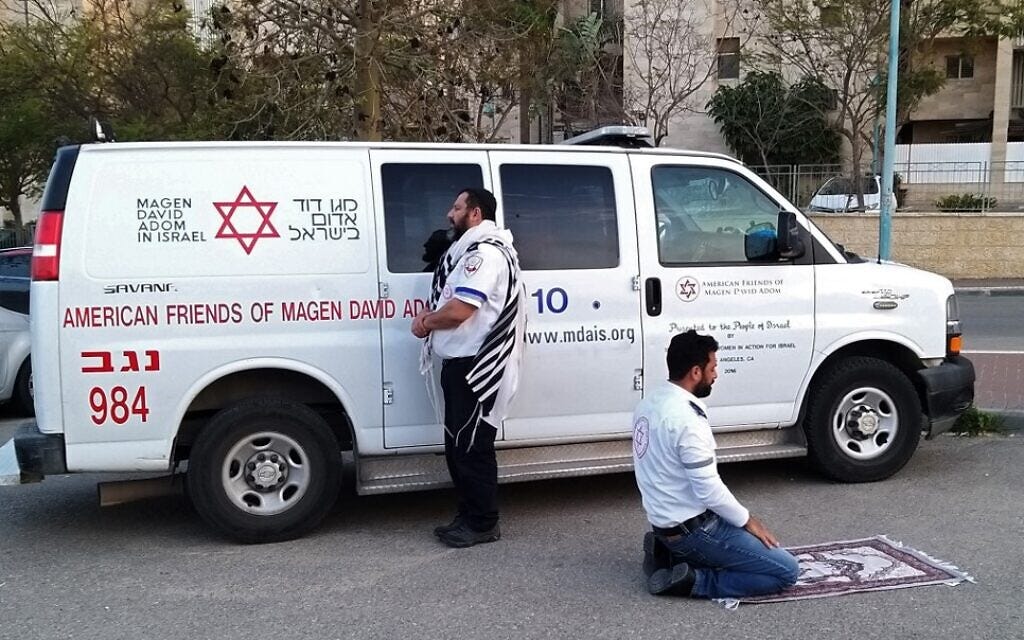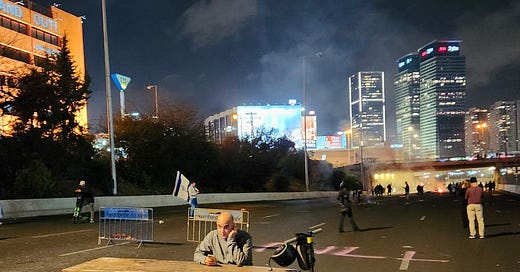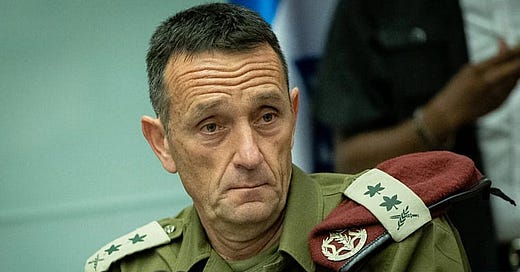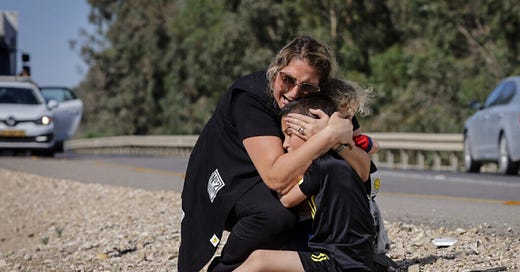

Discover more from Israel from the Inside with Daniel Gordis
When Hamas is not our biggest problem
Are we really going to rip this country to shreds without any help from across the border?
The gigantic elevator at Hadassah hospital, usually crammed with people, was empty, my wife told me. But this time, it was just her and an Arab orderly, and as the doors closed and the elevator began its long, slow climb, the silence was painfully awkward. After all, Hamas was firing missiles at Israel, Israel was bombing Gaza, and in the streets of Israel, Jews and Muslims were literally trying to slaughter each other.
Yom kasheh, she said to him, not knowing what else to say. “A rough day.”
Kol ha-chayim kasheh, he said to her in slightly broken Hebrew. “All of life is rough.”
That was quite the understatement.
Our latest war with Hamas is bringing devastation to both sides of the border, but few are surprised. It’s a dance, and both sides know the steps. Hamas will fire as many missiles as they can, killing as many civilians as they can, while we will bomb them relentlessly, trying to kill as few civilians as possible. Eventually, Hamas will ask for a cease fire, and when Israel decides that it’s done enough damage to hopefully buy a few years of quiet, the fighting will stop. Until the next round. We know how this goes because we’ve been here before.
On the streets of Israel, though, we are witness to something for which there is no precedent, no script, and no guarantee of victory, whatever “victory” might mean. Israeli Arabs extremists, incensed by events on the Temple Mount and angry about the war with Hamas, have attacked, shot and lynched Jews. Jewish extremists have attacked, shot and lynched Arabs. The police, underfunded and without real leadership for years, were totally unprepared and have been completely overwhelmed. Across the country, vigilantes on both sides are using social media to call people out to burn, destroy and attack. And to try to kill.
Benny Gantz, the Minister of Defense, is calling in reinforcements for the police while resisting Netanyahu’s call for bringing in the army. But even if the violence on the streets – which has Jews in some neighborhoods and Muslims in others too frightened to leave their homes – ends right now, the damage is done. Sane Israelis, both Muslim and Jewish, have been shocked into realizing how thin was the veneer of coexistence in cities like Jaffa, Lod, Jerusalem and elsewhere in the country. “We can bomb Gaza all we want,” is what one hears on the street, “but it doesn’t matter. We’re going to rip this country to shreds without any help from across the border.”
How did we get here? That’s a different question from “who started it,” or “who’s at fault” or “how are we going to fix this?” All those questions matter, but what I’d been hoping to do in this series (which I hadn’t planned to launch quite yet), is to explore parts of Israel that don’t make the headlines, to explain life here in light of what’s come before.
Just as one can’t understand the reaction to George Floyd’s murder without knowing something about slavery, the Civil War, Jim Crow, the civil rights movement of the 1960’s and more, nothing in Israel happens in a vacuum. Israel’s riots, which one has to pray do not become a low grade civil war, didn’t come out of nowhere. To understand Israel today, one needs to understand how we got here.
That could fill volumes, of course, but in brief, I’ll focus here on three issues:
The radically different narratives Jews and Arabs (all Israelis) have about what this country is
The complex historical circumstances which determined who would become an Israel Arab and who would become a refugee
The painful history of Israel’s security forces and Israel’s Arab citizens
Narratives
“What’s wrong with them?”, I’ve had a few friends ask me in recent days. “Don’t they know how lucky they are to be Israeli citizens, with education and health care and everything else citizenship provides?” Yes, they know, of course they do. But that’s far too glib. Life as an Israeli Arab is much more complex than that. Key to that are the two very different stories we tell about what this country is.
What is Israel? Most Jews answer with some version of the following: “After thousands of years of exile and a very painful history in the Diaspora, we chose to take our destiny into our own hands. We returned to our ancestral homeland and built a Jewish state that is an accomplishment far beyond what we might ever have dreamed.”
But that is not the story that Israeli Arabs tell. Most of them describe Israel with some version of the following: “We’d lived here for hundreds of years. Life was imperfect in many ways, but we were the dominant culture here. Then Jews began arriving from Europe and the Levant. With the support of the international community, they founded Israel. Now we’re a minority in a state created for them, not for us, in which our culture is no longer dominant, and it’s hard to see how Arabs can ever be fully first-class citizens in a state explicitly created to serve the Jewish people.”
Those who abhor complexity will seek reasons to deny one narrative or the other. But while these narratives are both simplistic, they are both largely true. And one can easily understand how hard it is to build a single society out of those two competing worldviews.
The Ironies and Vagaries of History
The history of what transpired with the Arabs of Palestine during Israel’s War of Independence is far too complex and controversial to cover here. [In subsequent posts, I’ll start sending out some suggested reading for those interested.] But let’s dumb it down for a moment, just for the sake of brevity.
Haifa, 1948. Or Jaffa, 1948. Or elsewhere. Fighting is raging and Arabs are frightened. Many decide to flee (let’s put aside for now the seething controversy about the origins of the Palestinian refugee problem), confident that they will return home when the hostilities subside. One family gets into its car and heads north or east; they and their descendants are now largely stateless refugees in Lebanon, Syria or Jordan. The family next door, let’s assume the brother of the first family, gets in its car to do the same. But the car won’t start. They’re stuck in Haifa or Jaffa or elsewhere, and they survive the war. Today, they are “Israelis”, while their family in the other car are “Palestinians.
Again, leave right and wrong aside for now. That little narrative about those two cars is true, in the same way that those narratives above are true. And some version of it happened to thousands of families. Can we at least acknowledge the emotional complexity of watching your country in endless war with your family?
Israeli Arabs and Israeli Security Forces
History matters. But we don’t study history anymore. So here are a few bullet points to remind us how complex this all is. Nothing justifies violence on the streets, but we can’t understand emotions without knowing where they come from.
Military Administration: After the War of Independence, David Ben-Gurion knows that 20% of the population of his new country are Arabs, and many of them are the ones who couldn’t get away. He’s not naïve about their loyalties. So Israel creates a Military Administration to govern Israel’s Arabs. Under this administration, which lasted until 1966 (Menachem Begin, the founder of the Likud, was one of the earliest voices calling to end it), Israel’s Arabs were tried by military courts and their freedom of movement was restricted (they had to obtain permission to leave their villages). Opportunities for higher education were de facto severely limited, and even elementary education was affected; under the military administration, the security services determined who could teach in Arab schools (not always on the basis of their pedagogical skills, obviously). The military administration is thankfully gone, but many, many Israeli Arabs are old enough to remember living under it.
Kafr Qassem: In October 1956, as Israel is preparing to go to war in the Sinai Campaign, a curfew is decreed for wide areas where Arabs live. In Kafr Qassem, which you pass driving up Highway 6 on the right and where cars were burned this week, people working in the fields had no idea about the curfew. They didn’t exactly have cell phones. On their way back to the village from the fields, Israeli soldiers opened fire on them, killing 47, including women and children, in cold blood. It was a shameful moment in Israel’s history, and since then, “Kafr Qassem” has become code in Israel for a blatantly immoral order which must never be obeyed.
The Six Day War: The PLO was founded in 1964 with the express purpose of destroying the State of Israel. So the notion that Palestinian hopes of wiping out the state only began after the “occupation” (again, we’ll leave complex terminology aside for now) in 1967 is utter bunk. That said, it’s also easy to see how Israel’s capture of the West Bank and Gaza in 1967 put Israel’s Arabs in an even more complex position.
October 2000: In clashes between Israeli security forces and rioting Israeli Arabs, the police killed (Israeli Arabs use the word “murdered”) 12 people. A commission of inquiry placed some blame at the feet of the police for being unprepared and using excessive force, but not much else happened. Families of the victims were outraged by the lack of consequences, while the police felt betrayed (sound familiar from America?).
Numerous other examples could be listed (I’ll return to the issue of the supposed “expulsion” in Sheikh Jarakh a different time), but here is the point: “What’s wrong with them? Don’t they know how lucky they are to be Israeli citizens?” is a grossly simplistic question about a very complex reality. Nothing justifies the lynching, the attacks, the burning of synagogues, the horrific disregard for the rule of law. Nothing. Nothing at all. But this didn’t come out of nowhere.
We’d thought (hoped) we were beyond this …
National unity here, for all of those reasons, was never going to be easy. American Jews (and American Jewish philanthropists very often) see Israel as one large “civil rights” issue. They care about blacks in America, so they care about Arabs in Israel. But the parallel is absurd. Here, on a certain level, it’s fundamentally insoluble.
Still, we were optimistic. During the pandemic, Arab doctors, nurses, ambulance staff and more served with great devotion on the front lines; Jews and Arabs alike expressed profound gratitude, and the country basked in a newfound sense of shared purpose. The Abraham Accords, in which the UAE and Bahrain (followed by Morocco, Sudan and even movement in Saudi Arabia) signaled the end of the Arab world’s rejection of Israel, also made matters easier for Israel’s Arabs. No longer would embracing their Israeliness mean betraying the Arab world. Then, Israeli Arabs so embraced the political process that Ra’am, one of their parties, was about to determine who would be the next Prime Minster.
All of that is gone now. The coalition is dead. The trust has evaporated. Floodgates of hate and resentment have come pouring out from all directions. Philanthropist friends have written me that they’re done funding projects for Israeli Arabs. Moderate Jews I know have said, “I was stupid. This is never going to work.”
But it has to work. Some 20% of Israel’s population is not going to get up and move somewhere else. Equally important, how to deal with this complexity is a worthy challenge for us, to see how Jews use power when we have it. We were minorities for thousands of years. What did we learn? Nothing? Something? What?
And it has to work because otherwise, this country will not make it. Zionism was never about having a flag. Or an army. Or borders. It was about creating a safe place where Jews could live, but even more, a place where we would put to the test the values we’d been preaching in books for thousands of years. The scene of Jews in Bat Yam pulling an Arab driver out of his car and beating him half to death (yes, Arabs did the same things to Jews, I know) is the greatest indictment of who we are – how we teach, what some of us we believe in, the moral leadership vacuum we have created and the sorts of human beings and Jews that some of have become – that I can imagine. The images online are so painful that it’s actually hard to breath.
As Shabbat nears, this is a united and determined country, but also a devastated and tear-soaked one. We’re going to defeat Hamas, that is certain. Once we do, though, and once the smoke clears, we now know we’re going to face an even harder challenge. Can we build something here that can last? Can we restore the sense of hope we’d had about what we’ve built?
Kol ha-chayim kasheh. “All of life is rough.”
Polite commiserating in the elevator is not going to cut it. Can we do the work needed to make a minority feel genuinely at home here? Will we be able to look in the mirror and tell ourselves, honestly, that yes, this is the place we want our children and grandchildren to grow up, that this is place worthy of the deep love we feel for it? Are we building a society genuinely worthy of all the young women and men who gave their lives so we can have it?
The mere fact that we have to ask is enough to break your heart.
Subscribe to Israel from the Inside with Daniel Gordis
Israel from the Inside is for people who want to understand Israel with nuance, who believe that Israel is neither hopelessly flawed and illegitimate, nor beyond critique. If thoughtful analysis of Israel and its people interests you, welcome!
















